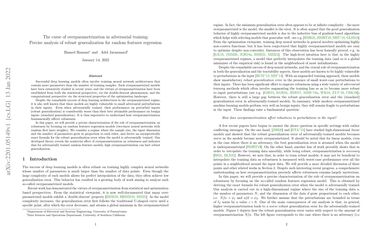The curse of overparametrization in adversarial training: Precise analysis of robust generalization for random features regression
Successful deep learning models often involve training neural network architectures that contain more parameters than the number of training samples. Such overparametrized models have been extensively studied in recent years, and the virtues of overparametrization have been established from both the statistical perspective, via the double-descent phenomenon, and the computational perspective via the structural properties of the optimization landscape. Despite the remarkable success of deep learning architectures in the overparametrized regime, it is also well known that these models are highly vulnerable to small adversarial perturbations in their inputs. Even when adversarially trained, their performance on perturbed inputs (robust generalization) is considerably worse than their best attainable performance on benign inputs (standard generalization). It is thus imperative to understand how overparametrization fundamentally affects robustness. In this paper, we will provide a precise characterization of the role of overparametrization on robustness by focusing on random features regression models (two-layer neural networks with random first layer weights). We consider a regime where the sample size, the input dimension and the number of parameters grow in proportion to each other, and derive an asymptotically exact formula for the robust generalization error when the model is adversarially trained. Our developed theory reveals the nontrivial effect of overparametrization on robustness and indicates that for adversarially trained random features models, high overparametrization can hurt robust generalization.
PDF Abstract
